【TED】如何掌控你的自由时间(中英文对照)
ted如何掌控你的自由时间演讲稿

ted如何掌控你的自由时间演讲稿TED,即Technology, Entertainment and Design,是一场旨在分享各种想法、经验和技术的年度盛会。
从第一场TED大会开始,TED已经走过了30余年的历程,成为了许多人所推崇的知识分享平台。
然而,如何掌握TED这种平台对于我们的自由时间的控制,我们仍然需要做出相应的选择和决策。
TED演讲的特点,有吸引人的演讲者、优秀的演讲内容、生动的演讲风格等等,这些特点使得TED演讲成为了人们追求高品质知识的首选。
而人们观看TED演讲的方式一般有两种。
第一,通过网络观看TED演讲的直播或者录播;第二,参加TED下属的Salon等组织所举办的小型活动。
对于前者,我们可以通过网络搜索TED资源,或者关注TED的官方账号、YouTube等视频播放平台,从而随时随地地观看到各种优质演讲。
对于后者,我们可以通过TED官网的“Find Local Groups”来搜索到自己所在城市或地区的TED活动,并参与其中。
这些活动通常由TED的合作伙伴或志愿者组织,主题分别有TEDx、TED Salon、TED Circle等等。
参加TED的活动,不仅能够结识志同道合的人,也能够面对面地和活动主讲人进行交流。
当然,TED的知识分享也带来了一定的时间成本。
每场演讲的时间一般为10-20分钟,而我们可能会花费数小时、数天、甚至数星期来观看TED演讲,并将所听到的内容转化为自己的知识,运用到自己的生活和工作中。
我们如何更好地掌握我们的自由时间,而不被TED这种平台所支配呢?首先,我们可以建立自己的学习计划,并合理安排时间表。
将自己需要了解的领域进行分类,设置优先级和时间期限,然后分时间段来完成学习任务。
这样,我们就可以避免花费过多时间在TED演讲上,而忽略了其他重要的学习内容。
其次,我们也可以利用一些辅助工具来帮助我们更好地掌握自己的时间。
例如,使用番茄工作法等时间管理工具,来帮助我们更好地控制自己的学习时间和工作时间。
如何掌控你的自由时间
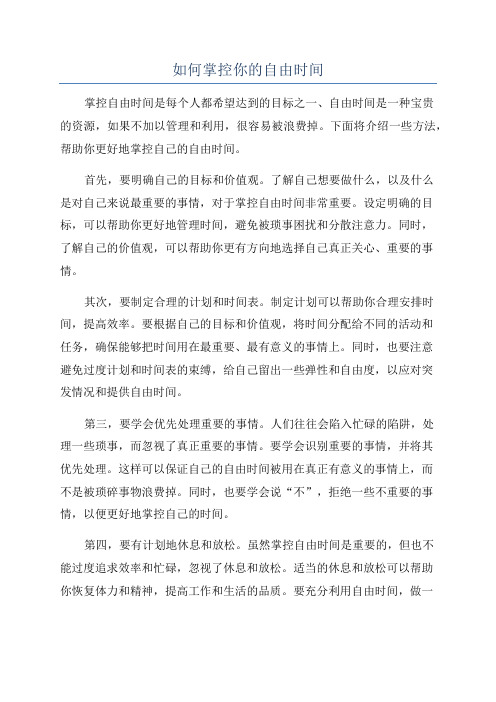
如何掌控你的自由时间掌控自由时间是每个人都希望达到的目标之一、自由时间是一种宝贵的资源,如果不加以管理和利用,很容易被浪费掉。
下面将介绍一些方法,帮助你更好地掌控自己的自由时间。
首先,要明确自己的目标和价值观。
了解自己想要做什么,以及什么是对自己来说最重要的事情,对于掌控自由时间非常重要。
设定明确的目标,可以帮助你更好地管理时间,避免被琐事困扰和分散注意力。
同时,了解自己的价值观,可以帮助你更有方向地选择自己真正关心、重要的事情。
其次,要制定合理的计划和时间表。
制定计划可以帮助你合理安排时间,提高效率。
要根据自己的目标和价值观,将时间分配给不同的活动和任务,确保能够把时间用在最重要、最有意义的事情上。
同时,也要注意避免过度计划和时间表的束缚,给自己留出一些弹性和自由度,以应对突发情况和提供自由时间。
第三,要学会优先处理重要的事情。
人们往往会陷入忙碌的陷阱,处理一些琐事,而忽视了真正重要的事情。
要学会识别重要的事情,并将其优先处理。
这样可以保证自己的自由时间被用在真正有意义的事情上,而不是被琐碎事物浪费掉。
同时,也要学会说“不”,拒绝一些不重要的事情,以便更好地掌控自己的时间。
第四,要有计划地休息和放松。
虽然掌控自由时间是重要的,但也不能过度追求效率和忙碌,忽视了休息和放松。
适当的休息和放松可以帮助你恢复体力和精神,提高工作和生活的品质。
要充分利用自由时间,做一些自己喜欢的事情,放松身心。
同时,也要学会平衡,避免过分放松,导致自由时间被浪费掉。
第五,要学会专注和集中注意力。
专注是提高工作效率和掌控自由时间的关键。
学会排除干扰和集中注意力,可以帮助你更快地完成任务,提高工作效率,从而腾出更多的自由时间。
要定期检查自己的注意力,避免分心和被琐事困扰,保持专注的状态。
第六,要适应变化和调整计划。
生活是充满变化的,有时候我们的计划可能无法如期进行。
要学会适应变化,灵活调整计划。
这样可以避免由于计划的破坏而导致自由时间的浪费,保持自由时间的掌控。
how to gain control your free time演讲稿
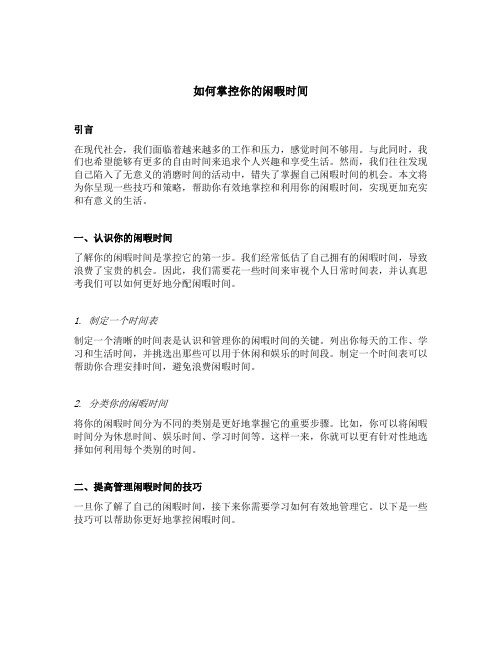
如何掌控你的闲暇时间引言在现代社会,我们面临着越来越多的工作和压力,感觉时间不够用。
与此同时,我们也希望能够有更多的自由时间来追求个人兴趣和享受生活。
然而,我们往往发现自己陷入了无意义的消磨时间的活动中,错失了掌握自己闲暇时间的机会。
本文将为你呈现一些技巧和策略,帮助你有效地掌控和利用你的闲暇时间,实现更加充实和有意义的生活。
一、认识你的闲暇时间了解你的闲暇时间是掌控它的第一步。
我们经常低估了自己拥有的闲暇时间,导致浪费了宝贵的机会。
因此,我们需要花一些时间来审视个人日常时间表,并认真思考我们可以如何更好地分配闲暇时间。
1. 制定一个时间表制定一个清晰的时间表是认识和管理你的闲暇时间的关键。
列出你每天的工作、学习和生活时间,并挑选出那些可以用于休闲和娱乐的时间段。
制定一个时间表可以帮助你合理安排时间,避免浪费闲暇时间。
2. 分类你的闲暇时间将你的闲暇时间分为不同的类别是更好地掌握它的重要步骤。
比如,你可以将闲暇时间分为休息时间、娱乐时间、学习时间等。
这样一来,你就可以更有针对性地选择如何利用每个类别的时间。
二、提高管理闲暇时间的技巧一旦你了解了自己的闲暇时间,接下来你需要学习如何有效地管理它。
以下是一些技巧可以帮助你更好地掌控闲暇时间。
1. 设定优先级在处理闲暇时间时,设定优先级是至关重要的。
你可以把自己的兴趣和目标与你的闲暇时间联系起来,并根据其重要性和紧急性,为每个任务设定优先级。
这将帮助你在有限的时间内更聪明地选择如何利用它。
2. 制定计划制定一个周密的计划可以帮助你更好地管理闲暇时间。
为你的闲暇时间编排一个清晰的计划表,将每个任务分配到特定的时间段。
当你有一个明确的计划时,你将更有可能坚持下去,并且更有效地利用你的时间。
三、充实闲暇时间的建议掌握了如何管理闲暇时间的技巧后,以下建议应该帮助你充实和享受你的闲暇时间。
1. 追求你的兴趣爱好闲暇时间是追求你的兴趣爱好的最佳时间。
无论是阅读、绘画、音乐、运动,或者学习新的技能,你可以用闲暇时间来发展和培养自己的兴趣爱好。
关于自由时间支配的英语对话(中英文)

A:在我看来,我们的自由时间应该多运动,多看书,多出去和同学散心,不要迷恋网络游戏。(In my opinion, we should exercise more free time, read a book, go for a walk with classmates , don't be addicted to network game.
A:再见。(Goodbye.)
B:再见。(Goodbye.)
B:我也这么认为。(I think so, too.)
A:很高兴和你讨论这个问题,我收获了很多。(Nice to talk to you about the problem, I have learned a lot.)
B:谢谢你给我的意见,我想我会支配好我的自由时间的。(Thank you for giving m my free time.)
A:你怎么了?(What's wrong with you?)
B:我在为我的自由时间的支配问题而烦恼。(I worry because of my free time control problem.)
A:原来是这样。那我们讨论一下关于自由时间的支配问题怎么样?(Oh, so that's it. Then we talk about free time control problem?)
如何让我的自由时间丰富多彩的,有意义?
A:你好,很高兴见到你!(Hello, nice to meet you!)
B:很高兴见到你!(Nice to meet you too!)
ted如何掌控你的自由时间演讲稿
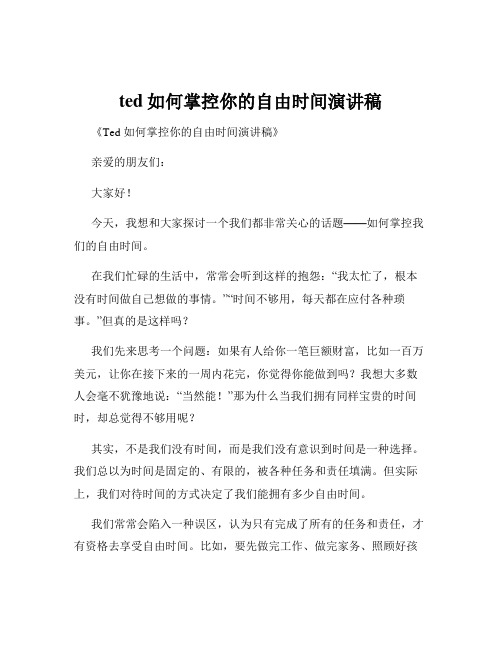
ted如何掌控你的自由时间演讲稿《Ted 如何掌控你的自由时间演讲稿》亲爱的朋友们:大家好!今天,我想和大家探讨一个我们都非常关心的话题——如何掌控我们的自由时间。
在我们忙碌的生活中,常常会听到这样的抱怨:“我太忙了,根本没有时间做自己想做的事情。
”“时间不够用,每天都在应付各种琐事。
”但真的是这样吗?我们先来思考一个问题:如果有人给你一笔巨额财富,比如一百万美元,让你在接下来的一周内花完,你觉得你能做到吗?我想大多数人会毫不犹豫地说:“当然能!”那为什么当我们拥有同样宝贵的时间时,却总觉得不够用呢?其实,不是我们没有时间,而是我们没有意识到时间是一种选择。
我们总以为时间是固定的、有限的,被各种任务和责任填满。
但实际上,我们对待时间的方式决定了我们能拥有多少自由时间。
我们常常会陷入一种误区,认为只有完成了所有的任务和责任,才有资格去享受自由时间。
比如,要先做完工作、做完家务、照顾好孩子,才能去看一场电影、读一本喜欢的书或者去运动。
但这样的想法会让我们永远处于等待的状态,因为任务永远做不完。
那么,如何才能改变这种状况呢?首先,我们要学会分析我们的时间都花在了哪里。
可以拿出一张纸,记录下你一天中从起床到睡觉的每一个小时都做了什么。
你可能会惊讶地发现,很多时间都被浪费在了一些无意义的事情上,比如刷手机、看电视、闲聊。
了解了时间的去向,我们就能更有针对性地做出调整。
接下来,我们要明确自己的价值观和优先事项。
什么对你来说是最重要的?是事业的成功、家庭的幸福、个人的成长还是健康的身体?根据你的价值观,确定哪些事情是你必须要做的,哪些是可以放弃或者委托给别人做的。
比如,如果健康对你来说很重要,那么每天抽出一个小时运动就应该成为你的优先事项。
然后,我们要学会说“不”。
很多时候,我们之所以忙碌不堪,是因为我们不懂得拒绝别人的请求。
我们害怕得罪人,害怕失去机会,但这样做的结果往往是让自己不堪重负。
要记住,你的时间是有限的,你有权选择把时间花在对你最重要的事情上。
【TED】如何掌控你的自由时间(中英文对照)
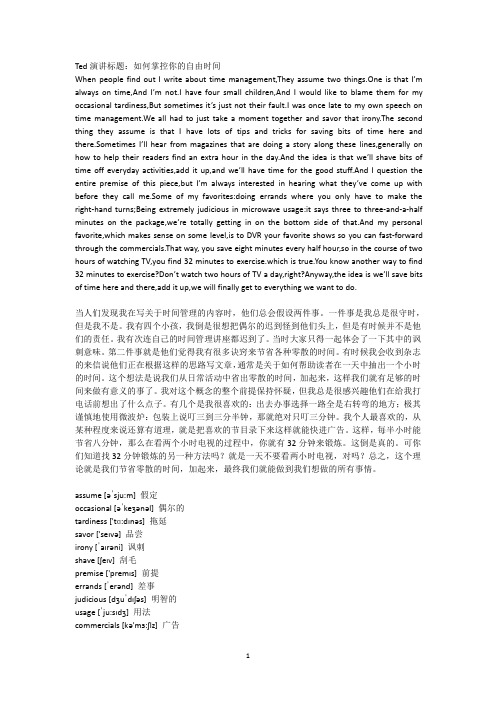
Ted演讲标题:如何掌控你的自由时间When people find out I write about time management,They assume two things.One is that I’m always on time,And I’m not.I have four small children,And I would like to blame them for my occasional tardiness,But sometimes it’s just not their fault.I was once late to my own speech on time management.We all had to just take a moment together and savor that irony.The second thing they assume is that I have lots of tips and tricks for saving bits of time here and there.Sometimes I’ll hear from magazines that are doing a story along these lines,generally on how to help their readers find an extra hour in the day.And the idea is that we’ll shave bits of time off everyday activities,add it up,and we’ll have time for the good stuff.And I question the entire premise of this piece,but I’m always interested in hearing what they’ve come up with before they call me.Some of my favorites:doing errands where you only have to make the right-hand turns;Being extremely judicious in microwave usage:it says three to three-and-a-half minutes on the package,we’re totally getting in on the bottom side of that.And my personal favorite,which makes sense on some level,is to DVR your favorite shows so you can fast-forward through the commercials.That way,you save eight minutes every half hour,so in the course of two hours of watching TV,you find32minutes to exercise.which is true.You know another way to find 32minutes to exercise?Don’t watch two hours of TV a day,right?Anyway,the idea is we’ll save bits of time here and there,add it up,we will finally get to everything we want to do.当人们发现我在写关于时间管理的内容时,他们总会假设两件事。
ted演讲稿中英文对照
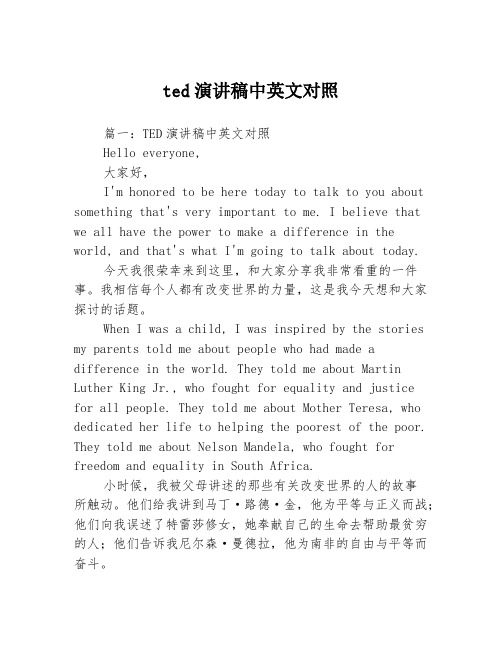
ted演讲稿中英文对照篇一:TED演讲稿中英文对照Hello everyone,大家好,I'm honored to be here today to talk to you about something that's very important to me. I believe that we all have the power to make a difference in the world, and that's what I'm going to talk about today.今天我很荣幸来到这里,和大家分享我非常看重的一件事。
我相信每个人都有改变世界的力量,这是我今天想和大家探讨的话题。
When I was a child, I was inspired by the stories my parents told me about people who had made a difference in the world. They told me about Martin Luther King Jr., who fought for equality and justicefor all people. They told me about Mother Teresa, who dedicated her life to helping the poorest of the poor. They told me about Nelson Mandela, who fought for freedom and equality in South Africa.小时候,我被父母讲述的那些有关改变世界的人的故事所触动。
他们给我讲到马丁·路德·金,他为平等与正义而战;他们向我误述了特雷莎修女,她奉献自己的生命去帮助最贫穷的人;他们告诉我尼尔森·曼德拉,他为南非的自由与平等而奋斗。
TED英语演讲:如何掌控你的自由时间
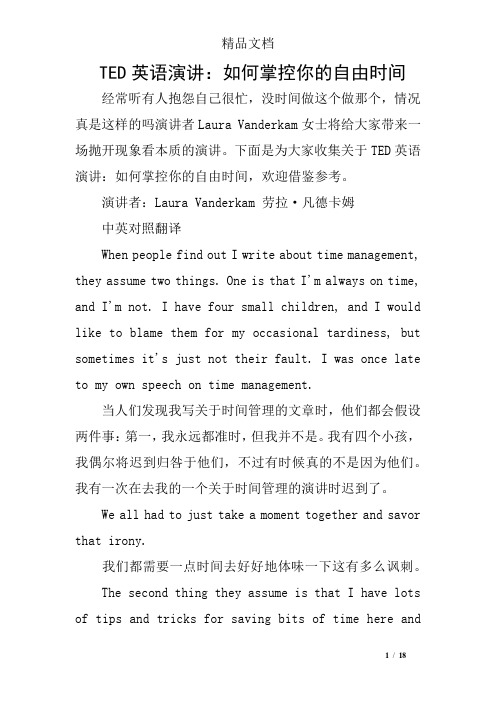
TED英语演讲:如何掌控你的自由时间经常听有人抱怨自己很忙,没时间做这个做那个,情况真是这样的吗演讲者Laura Vanderkam女士将给大家带来一场抛开现象看本质的演讲。
下面是为大家收集关于TED英语演讲:如何掌控你的自由时间,欢迎借鉴参考。
演讲者:Laura Vanderkam 劳拉·凡德卡姆中英对照翻译When people find out I write about time management, they assume two things. One is that I'm always on time, and I'm not. I have four small children, and I would like to blame them for my occasional tardiness, but sometimes it's just not their fault. I was once late to my own speech on time management.当人们发现我写关于时间管理的文章时,他们都会假设两件事:第一,我永远都准时,但我并不是。
我有四个小孩,我偶尔将迟到归咎于他们,不过有时候真的不是因为他们。
我有一次在去我的一个关于时间管理的演讲时迟到了。
We all had to just take a moment together and savor that irony.我们都需要一点时间去好好地体味一下这有多么讽刺。
The second thing they assume is that I have lots of tips and tricks for saving bits of time here andI'll hear from magazines that are doing a story along these lines, generally on how to help their readers find an extra hour in the day. And the idea is that we'll shave bits of time off everyday activities, add it up, and we'll have time for the good stuff.第二,人们总是假设我有很多关于如何节省时间的贴士和技巧。
ted如何掌控你的自由时间演讲稿

ted如何掌控你的自由时间演讲稿TED如何掌控你的自由时间TED演讲稿大家好,今天我要和大家分享的主题是“TED如何掌控你的自由时间”。
我们每个人都拥有24小时的时间,但有的人却能够做到高效利用时间,取得巨大成就,而有的人却总是感觉时间不够用,束手无策。
那么,让我们来看看TED是如何帮助我们掌控自由时间的。
第一部分:时间管理的重要性在讲述TED如何帮助我们掌控自由时间之前,我们首先要明白时间管理的重要性。
每个人的时间是有限的,如果我们不能合理地利用时间,就会导致工作效率低下、生活无序,甚至影响到身心健康。
因此,时间管理是我们追求高效生活的关键。
第二部分:TED演讲的特点TED作为一个全球知名的演讲平台,以其独特的演讲方式和丰富的主题吸引了成千上万的人关注。
下面,让我们来看看TED演讲的特点是什么。
1. 精彩短小的演讲时间TED演讲的时间限制一般为18分钟,这个时间对于演讲者来说是一种挑战,但也是一种机会。
演讲者必须在有限时间内准确表达自己的观点,这迫使他们专注于核心内容,去掉冗长的废话,使演讲更加精炼、简洁。
2. 强大的观众互动TED演讲注重与观众的互动,不仅是通过演讲者的表达方式,还包括演讲结束后的问答环节。
观众可以通过微笑、鼓掌、提问等方式与演讲者互动,这种互动能够激发出更多的启示和思考,让观众更深入地理解和吸收演讲内容。
3. 多元化的主题选择TED演讲涉及广泛的主题,涵盖科技、艺术、教育、领导力等各个领域,这使得我们可以从不同的角度来思考和看待问题。
不同的主题能够激发我们的创造力和思维方式,让我们在有限的时间内获得更多的启发。
第三部分:TED如何掌控你的自由时间现在,让我们来看看TED是如何帮助我们掌控自由时间的。
1. 短小精华的知识传递正如前面所提到的,TED演讲时间有限,演讲者必须在这有限的时间内将自己的观点传达给观众。
这使得演讲者必须选择性地呈现知识,只保留核心和重要的信息。
我们可以从中学到如何从庞杂的信息中提炼出关键和有价值的内容,避免陷入时间的浪费。
管理好自己的时间英文作文记叙
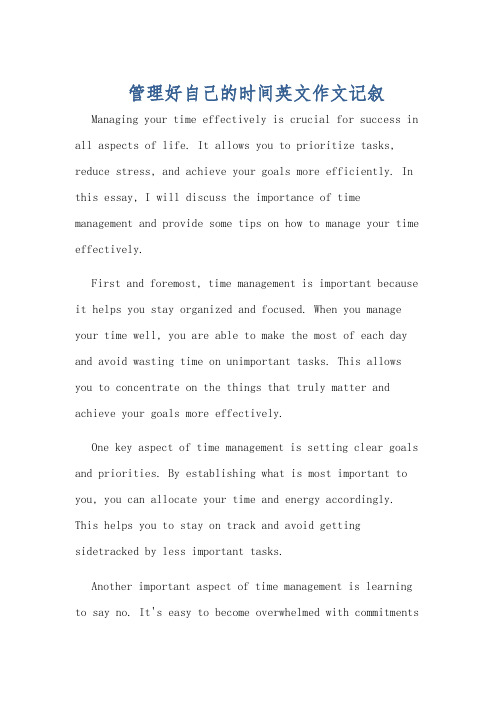
管理好自己的时间英文作文记叙Managing your time effectively is crucial for success in all aspects of life. It allows you to prioritize tasks, reduce stress, and achieve your goals more efficiently. In this essay, I will discuss the importance of time management and provide some tips on how to manage your time effectively.First and foremost, time management is important because it helps you stay organized and focused. When you manage your time well, you are able to make the most of each day and avoid wasting time on unimportant tasks. This allows you to concentrate on the things that truly matter and achieve your goals more effectively.One key aspect of time management is setting clear goals and priorities. By establishing what is most important to you, you can allocate your time and energy accordingly. This helps you to stay on track and avoid getting sidetracked by less important tasks.Another important aspect of time management is learning to say no. It's easy to become overwhelmed with commitmentsand obligations, but by learning to say no to things that don't align with your goals, you can free up more time for the things that truly matter.In addition, it's important to create a schedule andstick to it. This can help you stay organized and ensurethat you are using your time effectively. By setting aside specific blocks of time for different tasks, you can avoid procrastination and make the most of your time.Finally, it's important to take care of yourself and avoid burnout. This means taking regular breaks, getting enough sleep, and making time for activities that you enjoy. By taking care of your physical and mental well-being, you can ensure that you have the energy and focus to manageyour time effectively.In conclusion, time management is essential for successin all areas of life. By setting clear goals, learning to say no, creating a schedule, and taking care of yourself, you can manage your time effectively and achieve your goals more efficiently.有效管理时间对于成功是至关重要的。
(完整版)TED《出人意料的工作动机》中英文对照演讲稿)
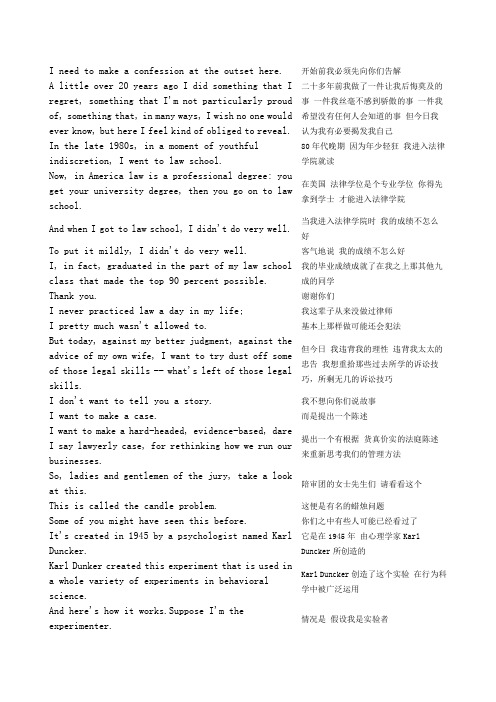
I need to make a confession at the outset here. 开始前我必须先向你们告解A little over 20 years ago I did something that I regret, something that I'm not particularly proud of, something that, in many ways, I wish no one would ever know, but here I feel kind of obliged to reveal. 二十多年前我做了一件让我后悔莫及的事一件我丝毫不感到骄傲的事一件我希望没有任何人会知道的事但今日我认为我有必要揭发我自己In the late 1980s, in a moment of youthful indiscretion, I went to law school. 80年代晚期因为年少轻狂我进入法律学院就读Now, in America law is a professional degree: you get your university degree, then you go on to law school. 在美国法律学位是个专业学位你得先拿到学士才能进入法律学院And when I got to law school, I didn't do very well. 当我进入法律学院时我的成绩不怎么好To put it mildly, I didn't do very well. 客气地说我的成绩不怎么好I, in fact, graduated in the part of my law school class that made the top 90 percent possible. 我的毕业成绩成就了在我之上那其他九成的同学Thank you. 谢谢你们I never practiced law a day in my life; 我这辈子从来没做过律师I pretty much wasn't allowed to. 基本上那样做可能还会犯法But today, against my better judgment, against the advice of my own wife, I want to try dust off some of those legal skills -- what's left of those legal skills. 但今日我违背我的理性违背我太太的忠告我想重拾那些过去所学的诉讼技巧,所剩无几的诉讼技巧I don't want to tell you a story. 我不想向你们说故事I want to make a case. 而是提出一个陈述I want to make a hard-headed, evidence-based, dare I say lawyerly case, for rethinking how we run our businesses. 提出一个有根据货真价实的法庭陈述来重新思考我们的管理方法So, ladies and gentlemen of the jury, take a lookat this.陪审团的女士先生们请看看这个This is called the candle problem. 这便是有名的蜡烛问题Some of you might have seen this before. 你们之中有些人可能已经看过了It's created in 1945 by a psychologist named Karl Duncker. 它是在1945年由心理学家Karl Duncker所创造的Karl Dunker created this experiment that is used in a whole variety of experiments in behavioral science. Karl Duncker创造了这个实验在行为科学中被广泛运用And here's how it works.Suppose I'm theexperimenter.情况是假设我是实验者I bring you into a room. I give you a candle, Some thumbtacks and some matches. 我带你进入一个房间给你一根蜡烛一些图钉和火柴And I say to you, “your job is to attach the candle to the wall so the wax doesn't drip onto the table.”Now what would you do? 告诉你说现在尝试把蜡烛固定在墙上让烛泪不要滴到桌上你会怎么做Now many people begin trying to thumbtack the candleto the wall.许多人尝试用图钉把蜡烛钉在墙上Doesn't work. 行不通Somebody, some people -- and I saw somebody kind of make the motion over here -- some people have a great idea where they light the match, melt the side of the candle, try to adhere it to the wall. 有些人台下也有些人做出这样的动作有些人想到他们可以点燃火柴溶化蜡烛的底部尝试把它黏在墙上It's an awesome idea. Doesn't work. 好主意但行不通And eventually, after five or 10 minutes,most people figure out the solution, which you can see here. 差不多过了五到十分钟大部分的人便会想出解决办法就像图片上那样The key is to overcome what's called functionalfixedness.重点是克服功能固着You look at that box and you see it only as a receptacle for the tacks. 当你看到盒子你不过把它当成装大头针的容器But it can also have this other function, as a platform for the candle. The candle problem. 但它还有其它功能那就是作为蜡烛的平台Now I want to tell you about an experiment using the candle problem, done by a scientist named Sam Glucksberg, who is now at Princeton University in the U.S. 现在我想告诉你另一个实验利用蜡烛问题由一个现在在普林斯顿大学叫做Sam Glucksberg 的科学家所做的实验This shows the power of incentives. 这实验让我们看见动机的力量Here's what he did. He gathered his participants. 他是这么做的他将参与者聚集在一个房间里And he said,“I'm going to time you. How quickly you can solve this problem ?”告诉他们我要开始计时看看你们能多快解决这个问题To one group he said, “I'm going to time you to establish norms, averages for how long it typically takes someone to solve this sort of problem.”他对其中一群人说我只是想取个平均值看一般人需要花多久的时间才能解决这样的问题To the second group he offered rewards. 他提供奖励给另一群人He said,“If you're in the top 25 percent of the fastest times, you get five dollars. If you're the fastest of everyone we're testing here today, you get 20 dollars.”他说如果你是前25%最快解决问题的人就能拿到五块钱如果你是今日所有人里解答最快的你就有20块钱Now this is several years ago. Adjusted for inflation, it's a decent sum of money for a few minutes of work. It's a nice motivator. 这个实验是几年前的事了按照通货膨胀几分钟就能拿到20块是很不错的是个不错的诱因Question: How much faster did this group solve the problem? 问题是这群人比另一群人的解题速度快了多少呢?Answer: It took them, on average, three and a half minutes longer. 答案是平均来说他们比另一组人多花了三分半钟Three and a half minutes longer. Now this makes nosense right?整整三分半钟这不合理不是吗I mean, I'm an American. I believe in free markets. 我是个美国人我相信自由市场That's not how it's supposed to work. Right? 这个实验不太对劲吧对吗If you want people to perform better, you reward them. Right? 如果你想要人们做得更好你便给他们奖赏对吗Bonuses, commissions, their own reality show. 红利佣金他们自己的真人秀Incentivize them. That's how business works. 赋予他们动机这就是商业法则But that's not happening here. 但实验里却不是这样You've got an incentive designed to sharpen thinking and accelerate creativity, and it does just the opposite. 奖励是为了增强思考能力及创意但事实却是相反It dulls thinking and blocks creativity. 它阻断了思考和创意能力And what's interesting about this experiment is thatit's not an aberration.有趣的事情是这个实验不是误差This has been replicated over and over and overagain, for nearly 40 years.它被一再重复在过去的四十年间These contingent motivators -- if you do this, then you get that -- work in some circumstances. 这些不同的诱因如果你这样做你就得到那个在某些情况里是可行的But for a lot of tasks, they actually either don't work or, often, they do harm. 但在许多任务中他们不是没有作用更有可能产生反效果This is one of the most robust findings in social science, and also one of the most ignored. 这是在社会科学中一项最有力的发现同时也是最为人忽略的I spent the last couple of years looking at thescience of human motivation, particularly the dynamics of extrinsic motivators and intrinsic motivators. 过去两年我研究人类的动机尤其是那些外部的激励因素和内在的激励因素And I'm telling you, it's not even close. 我可以告诉你两者相差悬殊If you look at the science, there is a mismatch between what science knows and what business does. 如果你使用科学方法查证你会发现科学知识和商业行为之间有条鸿沟And what's alarming here is that our business 我们必须注意的是我们的商业机制想operating system -- think of the set of assumptions and protocols beneath our businesses, how we motivate people, how we apply our human resources -- it's built entirely around these extrinsic motivators, around carrots and sticks. 想这些商业的协议和假设我们如何激励人心如何运用人资全是以这些外部激励因素作为基础打手心给块糖That's actually fine for many kinds of 20th centurytasks.对许多20世纪的工作来说是可行的But for 21st century tasks, that mechanistic, reward-and-punishment approach doesn't work, often doesn't work, and often does harm. 但面对21世纪的工作这些机械化的奖惩分明的作法已经不管用了有时更招致反效果Let me show you what I mean. 让我呈现我想表达的So Glucksberg did another experiment similar to this where he presented the problem in a slightly different way, like this up here. Okey? Glucksberg做了一个类似的实验这次他给了他们一个比较不同的问题像这个图里面的Attach the candle to the wall so the wax doesn't drip onto the table. 实验对象必须要找出一个让蜡烛黏在墙上又不会流下烛泪的方法Same deal.You: we're timing for norms. 相同地这边:我们要的是平均时间You: we're incentivizing. 这边:一样的给他们不同的诱因What happened this time? 结果呢This time, the incentivized group kicked the other group's butt. 这次有诱因的那组人远远地胜过了另一组人Why? Because when the tacks are out of the box, it's pretty easy isn't it? 为什么一旦我们把图钉从盒子里拿出来问题就变得相当简单不是吗If-then rewards work really well for those sorts of tasks, where there is a simple set of rules and a clear destination to go to. 假设在这个情况下奖励就变得非常有郊在规则简单目标明显的情况下Rewards, by their very nature, narrow our focus, concentrate the mind; that's why they work in so many cases. 奖励产生了作用让我们集中精神变得专注这便是为何奖励在许多情况下有效的缘故And so, for tasks like this, a narrow focus, where you just see the goal right there, zoom straight ahead to it, they work really well. 当我们面对的工作是范围狭窄你能清楚见到目标向前直冲时奖励便非常有效But for the real candle problem, you don't want to be looking like this. 但在真正的蜡烛问题中你不能只是这样看The solution is not over here. The solution is onthe periphery.解答不在那里解答是在周围You want to be looking around. 你需要四处找寻That reward actually narrows our focus and restricts 奖励却令我们眼光狭隘限制了我们的our possibility. 想像力Let me tell you why this is so important. 让我告诉你这个问题的重要性In western Europe, in many parts of Asia, in North America, in Australia, white-collar workers are doing less of this kind of work, and more of this kind of work. 在西欧亚洲的许多地方北美洲澳洲白领工作者比较少处理这种问题更多的是这种问题(指钉放在盒中的)That routine, rule-based, left-brain work--certainkinds of accounting, certain kinds of financial analysis, certain kinds of computerprogramming--has become fairly easy to outsource, fairly easy to automate. 那些例行的常规性的左脑式的工作一些会计一些财务分析一些电脑编程变得极为容易外包变得自动化Software can do it faster. 软件能处理的更快Low-cost providers around the world can do it cheaper. 世界其他地方的低价供应商能以更便宜的成本来完成So what really matters are the more right-brained creative, conceptual kinds of abilities. 所以更重要的是右脑的创意概念式的能力Think about your own work. 想想你的工作Think about your own work. 想想你自己的工作Are the problems that you face, or even the problems we've been talking about here, are those kinds of problems--do they have a clear set of rules, and a single solution? No. 你所面对的问题甚至是我们今天所谈论到的问题这些问题它们有清楚的规则和一个简单的解答吗没有The rules are mystifying. 它们的规则模糊The solution, if it exists at all, is surprising and not obvious. 解答如果有解答的话通常是令人意外而不明显的Everybody in this room is dealing with their own version of the candle problem. 在这里的每个人都在尝试解决他自己的蜡烛问题And for candle problems of any kind, in any field, those if-then rewards, the things around which built so many of our businesses, don't work. 对所有形式的蜡烛问题在所有领域这些如果-那就的奖励这些在商业世界里无处不在的奖惩系统其实没用Now, I mean it makes me crazy. 这简直让我发狂And this is not--here's the thing. 这不是重点是This is not a feeling. 这不是一种感觉Okey? I'm a lawyer; I don't believe in feelings. 我是个律师我才不信什么感觉This is not a philosophy. 这也不是哲学I'm an American; I don't believe in philosophy. 我是个美国人我才不信什么哲学This is a fact--or, as we say in my hometown of Washington, D.C., a true fact. 这是真相或是我们在华盛顿特区的政治圈常说的一个事实真相Let me give you an example of what I mean. 让我给你一个例子Let me marshal the evidence here, because I'm not telling you a story, I'm making a case. 让我收集这些证据因为我不是在告诉你一个故事而是陈述一个案子Ladies and gentlemen of the jury, some evidence: 陪审团的女士们先生们证据在此Dan Ariely, one of the great economists of our time, he and three colleagues, did a study of some MIT students. Dan Ariely 一位当代伟大的经济学家他和三位同仁对麻省理工学院的学生做了一些研究They gave these MIT students a bunch of games, games that involved creativity, and motor skills, and concentration. 他给这些学生一些游戏一些需要创造力的游戏需要动力和专注And the offered them, for performance, three levels of rewards: small reward, medium reward, large reward. 依照他们的表现给他们三种不同程序的奖励小奖励中奖励大奖励Okey? If you do really well you get the large reward, on down. 如果你做得好你就得到大奖励依此类推What happened? As long as the task involved onlymechanical skill bonuses worked as they would be expected: the higher the pay, the better the performance. 结果呢只要是机械形态的工作红利就像我们所认知的奖励越高表现越好Okey? But one the task called for even rudimentary cognitive skill, a larger reward led to poorer performance. 是的但如果这个工作需要任何基本的认知能力越大的奖励却带来越差的表现Then they said:“Okey let's see if there's any cultural bias here. Lets go to Madurai, India and test this.”于是他们说让我们试试是否有什么文化差距让我们去印度的马杜赖试试Standard of living is lower. 生活水平较低In Madurai, a reward that is modest in North American standards, is more meaningful there. 在马杜赖北美标准的中等奖励在这里有意义多了Same deal. A bunch of games, three levels of rewards. 一样地一些不同游戏三种奖励What happens? 结果呢People offered the medium level of rewards did no better than people offered the small rewards. 中等奖励的人做的不比那些小奖励的人好But this time, people offered the highest rewards, they did the worst of all. 但这次那些能够得到大奖励的人表现最差In eight of the nine tasks we examined across three experiments, higher incentives led to worse performance. 三种实验中在我们提供的九个游戏中有八个奖励越高的表现越差Is this some kind of touchy-feely socialist 难道这是一种感情用事的社会主义的阴conspiracy going on here? 谋诡计吗No. These are economists from MIT, from Carnegie Mellon, from the University of Chicago. 不这些经济学家来自麻省理工卡内基梅隆和芝加哥大学And do you know who sponsored this research? 你知道赞助这实验的是谁吗The Federal Reserve Bank of the United States. 是美国联邦储备银行That's the American experience. 完全的美国经验Let's go across the pond to the London School of Economics--LSE, London School of Economics, alma mater of 11 Nobel Laureates in economics. 让我们跨海到伦敦政经学院看看LSE 伦敦经济学院十一位诺贝尔经济奖得主的母校Training ground for great economic thinkers like George Soros, and Friedrich Hayek, and Mick Jagger. 训练伟大经济学家的地方有乔治索罗斯弗里德里希·哈耶克和滚石乐团的米克·贾格尔Last month, just last month, economists at LSE looked at 51 studies of pay-for-performance plans, inside of companies. 上个月才刚过去的那个月政经学院的经济学家汇整了51个关于企业内部绩效薪酬的研究Here's what the economists there said:“ We find that financial incentives can result a negative impact on overall performance.”这些经济学家说我们发现金钱的诱因能对整体绩效带来负面效果There is a mismatch between what science knows andwhat business does.科学知识和商业行为之间有条鸿沟And what worries me, as we stand here in the rubble of the economic collapse, is that too many organizations are making their decisions, their policies about talent and people, based on assumptions that are outdated, unexamined, and rooted more in folklore than in science. 我所忧心的是在我们站在金融风暴废墟之间的此刻仍然有太多团体仍然以一些过时的未经验证的非科学的几乎是来自天方夜谭的假设来制定规则和管理人事And if we really want to get out of this economic mess, and if we really want high performance on those definitional tasks of the 21st century, the solution is not to do more of the wrong things, to entice people with a sweeter carrot, or threaten them with a sharper stick. 如果我们真的想要摆脱这个经济危机如果我们真的想要在这些属于21世纪的核心工作中获取绩效的话这解答无异是错上加错用胡萝卜来吸引人或是用棍子来威胁人We need a whole new approach. 我们需要一种新做法And the good news about all of this is that the scientists who've been studying motivation have given us this new approach. 好消息是这些研究人类动机的科学家已经给了我们一个新方向It's an approach built much more around intrinsicmotivation.这个新方向讲求内在的诱因Around the desire to do things because they matter,because we like it, because they're interesting, because they are part of something important. 我们想做的是因为它能改变世界因为我们喜欢因为它很有趣因为它能影响的范围很广And to my mind, that new operating system for our businesses revolves around three elements: autonomy, mastery and purpose. 在我心里这种新的商业机制围绕在三个基础上自主性掌握力和使命感Autonomy: the urge to direct our own lives. 自主性想要主掌自己人生的需求Mastery: the desire to get better and better at something that matters. 掌握力想要在举足轻重的事情上做得更好的欲望Purpose: the yearning to do what we do in the service of something larger than ourselves. 使命感希望我们所做的事情是为了更高远的理想的渴望These are the building blocks of an entirely newoperating system for our businesses.这些便是建立新商业机制的基石I want to talk today only about autonomy. 今天我只想提到自主性In the 20th century, we came up with this idea ofmanagement.20世纪产生了管理学的想法Management did not emanate from nature. 管理学不是自然发生的Management is like -- it's not a tree, it's a television set. 管理学像是它不是一棵树而是个电视机Okey? Somebody invented it. 对吗有人发明它And it doesn't mean it's going to work forever. 不代表它永远都好用Management is great. 管理学很好Trditional notions of management are great if you want compliance. 传统的管理学的概念是好的如果你需要的是服从But if you want engagement, self-direction works better. 但如果你想要员工全心投入自动自发更好Let me give you some examples of some kind if radical notions of self-direction. 有关自动自发让我给你一些革命性的例子What this means -- you don't see a lot of it, but you see the first stirrings of something really interesting going on, because what it means is paying people adequately and firly, absolutely -- getting the issue of money off the table, and then giving people lots of autonomy. 代表着这样的例子不多但是你可以发现一些有趣的事情正开始发生因为他代表着付给人们合理与足够的工资让钱不再是问题然后给人们很大的自主权Let me give you some examples. 让我举一些例子How many of you have heard of the company Atlassian? 在座谁听过一家叫Atlassian的公司It looks like less than half. 看起来一半都不到Atlassian is an Australian software company. Atlassian是一个澳大利亚的软件公司And they do something incredibly cool. 他们做了一件很酷的事A few times a year they tell their engineers, “Go for the next 24 hours and work on anything you want, as long as it's not part of your regular job. 一年有几次他们跟公司里的软件工程师说接下来的24个小时去做你自己想做的事只要它和你每天的工作无关Work on anything you want.”随便你要做什么都行So that engineers use this time to come up with a cool patch for code, come up with an elegant hack. 这些工程师便利用这些时间写出一套有趣的编程优雅地包装这些想法Then they present all of the stuff that they've developed to their teammates, to the rest of the company, in this wild and wooly all-hands meeting at the end of the day. 在那天的最后在这个全员到齐万众一心的会议中对他们的组员和整个公司介绍他的发明And then, being Australians, everybody has a beer. 当然身为澳大利亚人大家都得来罐啤酒They call them FedEx Days. 他们叫这是FedEx联邦快递日Why? Because you have to deliver somethingovernight.国为你必须在隔夜交出你的作品It's pretty. It's not bad. It's a huge trademark violation, but it's pretty clever. 很不赖的想法虽然违反商标法但这个想法很聪明That one day of intense autonomy has produced a whole array of software fixes that might never have existed. 在高度自主的一日中他们做出了许多软件编程的革新之前根本没人想到的And it's worked so well that Atlassian has taken it to the next level with 20 Percent Time -- done, famously, at Google -- where engineers can work, spend 20 percent of their time working on anything they want. 这个计划的成功让Altlassian更进一步的发明了五分之一时间谷歌把这个想法发扬光大工程师可以用五分之一的时间做所有他们想做的事情They have autonomy over their time, their task, their team, their technique. 他们可以自由的分配他们的时间工作组员和作法Okey? Radical amounts of autonomy. 就是这样完全的自主权And at Google, as most as many of you know, about half of the new products in a typical year are birthed during that 20 Percent Time: things like Gmail, Orkut, Google News. 诚如大家说所在谷歌一年中有一半的新商品都来自这五分之一时间像谷歌信箱 Qrkut 谷歌新闻Let me give you an even more radical example of it: something called the Results Only Work Environment, the ROWE, created by two American consultants, in place at about a dozen companies around North America. 让我给你一个更具革命性的例子一个叫做只论结果的工作环境简写是ROWE 由两个美国分析师所创造用在十多家北美公司上In a ROWE people don't have schedules. 在ROWE之中人们没有日程表They show up when they want. 他们想来就来They don't have to be in the office at a certain time, or any time. 他们不需要在特定时间到公司任何时间They just have to get their work done. 他们只需要把工作完成How they do it, when they do it, where they do it, is totally up to them. 怎么做何时做在哪里做都取决于他们自己Meetings in these kinds of environments areoptional.甚至连开会都是选择性的What happens? 结果呢Almost across the board, productivity goes up, worker engagement goes up, worker satisfaction goes up, turnover goes down. 几乎所有公司的生产力都提升了工作投入度提升工作满意度提升人才流失降低Autonomy, mastery and purpose, these are the buiding blocks of a new way of dong things. 自主性掌握力和使命感这便是新工作方式的新基础Now some of you might look at this and say,“hmm,that sounds nice, but it's utopian.”在座的某些人可能会看着然后说嗯听起来不错就是太理想化了And I say,“Nope. I have proof.”我说错了我有证据The mid-1990s, Microsoft started an encyclopedia called Encarta. 在90年代中微软开始了一个叫做Encarta的百科全书计划They had deployed all the right incentives, all the right incentives. They paid professionals to write and edit thousands of articles. 他们使用了所有正确的诱因所有的诱因他们付钱给专业人士让他们写和编辑这些文章Well-compensated managers oversaw the whole thing to make sure it came in on budget and on time. 收入颇丰的主管们监督着整个计划确定它不会超过预算和时间A few years later another encyclopedia got started. 几年后另一个百科全书计划开始了Different model, right? 完全不同的模式Do it for fun. No one gets paid a cent, or a Euro or a Yen. 为了兴趣而作没有人能拿到任何一毛钱Do it because you like to do it. 因为自己喜欢而做Now if you had, just 10 years ago, if you had goneto an economist, anywhere, and said,“Hey, I've got these two different models for creating an encyclopedia. If they went head to head, who would win?”如果你在十年前到一个经济学家那里去对他说我有两种撰写百科全书的模式拿来相比谁会赢10 years ago you could not have found a single sober economist anywhere on planet Earth who would have predicted the Wikipedia model.十年前你绝对不会找到任何一个清醒的经济学家在这个地球的任何角落能够预知维基百科的模式This is the titanic battle between these twoapproaches.这是一个两种模式之间的世纪战役This is the Ali-Frazier of motivation. Right? 动机的阿里与弗雷泽之战This is the Thrilla' in Manila. 就像那场在马尼拉的拳王之战Alright? Intrinsic motivators versus extrinsicmotivators.是吗内在动机和外在动机Autonomy, mastery and purpose, versus carrot and sticks. And who wins? 自主性掌握力和使命感和胡萝卜和棍子谁赢了Intrinsic motivation, autonomy, mastery and purpose, in a knockout. Let me wrap up. 内在动机自主性掌握力和使命感获得压倒性胜利结论是There is a mismatch between what science knows andwhat business does.科学知识和商业行为之间And here is what science knows. 有条鸿沟One: Those 20th century rewards, those motivators we think are a natural part of business, do work, but only in a surprisingly narrow band of circumstances. 一这些20世纪的奖励这些我们当作商业中自然一部分的诱因是有用的但意外地只在一个非常狭窄的情况下Two: Those if-then rewards often destroycreativity.二这些奖励往往会破坏创造力Three: The secret to high performance isn't rewards and punishments, but that unseen intrinsic drive -- the drive to do things for their own sake. 三高绩效的秘密不是奖励和惩罚而是看不见的内在动力让人为了自己而做的动力The drive to do things cause they matter. 让人有使命感的动力And here's the best part. Here's the best part. 最好的是We already know this. The science confirms what we know in our hearts. 我们了然于心科学不过确认了我们心里的声音So, if we repair this mismatch between what science knows and what business does, if we bring our motivation, notions of motivation into the 21st century, if we get past this lazy, dangerous, ideology of carrots and sticks, we can strengthen our business, we can solve a lot of those candle problems, and maybe, maybe, maybe we can change the world. 如果我们改变科学知识和商业行为之间有的那条鸿沟如果我们把我们的动机对诱因的想法带进21世纪如果我们越过懒惰的危险的理想化的胡萝卜和棍子的想法我们可以强化我们的公司解决许多的蜡烛问题那么或许或许或许我们便能改变世界I rest my case. 陈述完毕。
ted演讲自由时间管理
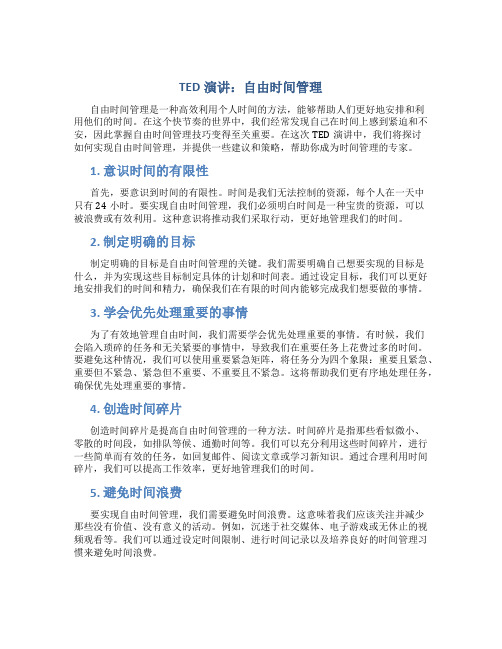
TED演讲:自由时间管理自由时间管理是一种高效利用个人时间的方法,能够帮助人们更好地安排和利用他们的时间。
在这个快节奏的世界中,我们经常发现自己在时间上感到紧迫和不安,因此掌握自由时间管理技巧变得至关重要。
在这次TED演讲中,我们将探讨如何实现自由时间管理,并提供一些建议和策略,帮助你成为时间管理的专家。
1. 意识时间的有限性首先,要意识到时间的有限性。
时间是我们无法控制的资源,每个人在一天中只有24小时。
要实现自由时间管理,我们必须明白时间是一种宝贵的资源,可以被浪费或有效利用。
这种意识将推动我们采取行动,更好地管理我们的时间。
2. 制定明确的目标制定明确的目标是自由时间管理的关键。
我们需要明确自己想要实现的目标是什么,并为实现这些目标制定具体的计划和时间表。
通过设定目标,我们可以更好地安排我们的时间和精力,确保我们在有限的时间内能够完成我们想要做的事情。
3. 学会优先处理重要的事情为了有效地管理自由时间,我们需要学会优先处理重要的事情。
有时候,我们会陷入琐碎的任务和无关紧要的事情中,导致我们在重要任务上花费过多的时间。
要避免这种情况,我们可以使用重要紧急矩阵,将任务分为四个象限:重要且紧急、重要但不紧急、紧急但不重要、不重要且不紧急。
这将帮助我们更有序地处理任务,确保优先处理重要的事情。
4. 创造时间碎片创造时间碎片是提高自由时间管理的一种方法。
时间碎片是指那些看似微小、零散的时间段,如排队等候、通勤时间等。
我们可以充分利用这些时间碎片,进行一些简单而有效的任务,如回复邮件、阅读文章或学习新知识。
通过合理利用时间碎片,我们可以提高工作效率,更好地管理我们的时间。
5. 避免时间浪费要实现自由时间管理,我们需要避免时间浪费。
这意味着我们应该关注并减少那些没有价值、没有意义的活动。
例如,沉迷于社交媒体、电子游戏或无休止的视频观看等。
我们可以通过设定时间限制、进行时间记录以及培养良好的时间管理习惯来避免时间浪费。
如何管理好自己的时间英语作文
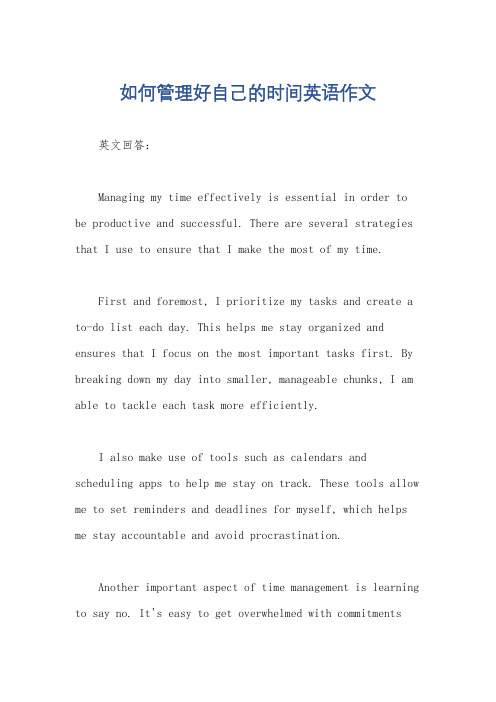
如何管理好自己的时间英语作文英文回答:Managing my time effectively is essential in order to be productive and successful. There are several strategies that I use to ensure that I make the most of my time.First and foremost, I prioritize my tasks and create a to-do list each day. This helps me stay organized and ensures that I focus on the most important tasks first. By breaking down my day into smaller, manageable chunks, I am able to tackle each task more efficiently.I also make use of tools such as calendars and scheduling apps to help me stay on track. These tools allow me to set reminders and deadlines for myself, which helps me stay accountable and avoid procrastination.Another important aspect of time management is learning to say no. It's easy to get overwhelmed with commitmentsand obligations, but it's important to prioritize and only take on tasks that are truly important and align with my goals.Additionally, I make sure to schedule in time forbreaks and self-care. It's important to take care of my physical and mental well-being in order to be able to perform at my best. Taking short breaks throughout the day can actually improve my productivity and focus.In conclusion, managing my time effectively requires a combination of organization, prioritization, and self-care. By implementing these strategies, I am able to make themost of my time and achieve my goals.中文回答:有效管理我的时间对于提高工作效率和取得成功至关重要。
时间管理法则中英文对照

时间管理法则中英文对照Today, I’d like to talk about an important topic, one that is very closely related to time management.今天我想分享一个老生常谈的话题,因为讲时间管理绕不开这部分。
What I want to say is that time cannot be managed, but you can manage yourselves. By managing your habits and your actions, you can achieve the same effect as managing time.我想说:时间是无法管理的,能够管理的只有自己。
透过管理自己的习惯,管理自己的事件来达成对时间的管理。
Are there any theories, methods or tools in this world that tell us how to improve and how we manage our matters and habits? management essay writing 那当今世界上有哪些非常成熟的理论、方法和工具,可以让我们能够更好地去管理自己的事件和习惯呢?Peter Drucker, known as the father of management theory said about time management: “Time is man’s sca rcest resource.” He even ranks time management as one of the top five skills needed in an effective manager.首先是我们管理学的泰斗,叫德鲁克。
德鲁克老先生,他是这么说时间管理的,他说:“时间是一个人最重要的稀缺性资源。
ted如何掌控你的自由时间演讲稿

ted如何掌控你的自由时间演讲稿《TED 如何掌控你的自由时间演讲稿》亲爱的朋友们:大家好!今天,我想和大家探讨一个我们都非常关心的话题——如何掌控我们的自由时间。
在我们忙碌的生活中,常常会听到这样的抱怨:“我没有时间做我想做的事。
”“时间根本不够用。
”但事实真的如此吗?我们先来思考一下,我们是如何看待时间的。
很多时候,我们把时间当作一种有限的资源,就像金钱一样,觉得用完了就没有了。
然而,时间和金钱有一个很大的不同。
金钱,如果你花掉了,它就真的没了。
但时间,无论你如何度过,它都会过去。
想象一下,有一个装满了弹珠的罐子,代表着你一生的时间。
每一颗弹珠就是一天。
当你度过一天,就从罐子里拿出一颗弹珠。
随着日子一天天过去,罐子里的弹珠越来越少。
但关键是,我们并不知道这个罐子到底有多大,我们也不知道还剩下多少弹珠。
这就是时间的不确定性。
那么,为什么我们总觉得没有时间呢?一个重要的原因是,我们把时间花在了那些看似紧急,但实际上并不重要的事情上。
比如说,不停地查看手机上的消息,或者沉迷于无意义的社交活动。
这些事情占据了我们大量的时间,却没有给我们带来真正的价值。
那么,如何改变这种状况呢?首先,我们需要明确自己的价值观和目标。
问问自己,什么对我来说是最重要的?是事业的成功?家庭的幸福?还是个人的成长?一旦明确了自己的价值观和目标,我们就可以根据它们来安排我们的时间。
比如说,如果你的目标是保持健康的身体,那么你就应该把时间花在锻炼和合理饮食上。
如果你的目标是提升自己的专业技能,那么你就应该每天抽出一定的时间来学习和实践。
接下来,学会拒绝那些不重要的事情。
这可能并不容易,因为我们常常害怕拒绝会让别人不高兴。
但请记住,你的时间是宝贵的,你有权决定如何使用它。
同时,我们要善于利用碎片时间。
很多人觉得碎片时间太短,做不了什么大事。
但其实,碎片时间也可以发挥很大的作用。
比如,在等公交车的时候,你可以听一段有声书;在排队的时候,你可以回复一封重要的邮件。
管理好自己的时间英文作文
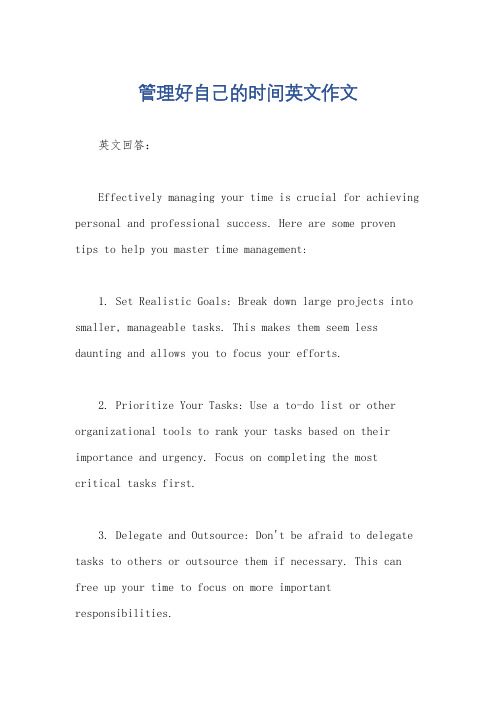
管理好自己的时间英文作文英文回答:Effectively managing your time is crucial for achieving personal and professional success. Here are some proventips to help you master time management:1. Set Realistic Goals: Break down large projects into smaller, manageable tasks. This makes them seem less daunting and allows you to focus your efforts.2. Prioritize Your Tasks: Use a to-do list or other organizational tools to rank your tasks based on their importance and urgency. Focus on completing the mostcritical tasks first.3. Delegate and Outsource: Don't be afraid to delegate tasks to others or outsource them if necessary. This can free up your time to focus on more important responsibilities.4. Use a Planner or Calendar: Plan your schedule in advance and stick to it as much as possible. This will help you visualize your time and avoid overcommitting.5. Take Breaks: Regular breaks are essential for maintaining focus and productivity. Step away from your work periodically to clear your mind and recharge.6. Avoid Distractions: Minimize distractions such as social media, emails, or unnecessary conversations. Use noise-canceling headphones or find a quiet workspace to stay focused.7. Automate Tasks: Consider using technology to automate repetitive tasks, such as email scheduling or data entry. This can save you time and increase efficiency.8. Learn to Say No: It's okay to politely decline additional responsibilities if you're already overwhelmed. Protecting your time is crucial for maintaining your well-being.9. Track Your Time: Use a time-tracking tool to monitor how you spend your time. This will help you identify areas where you can improve your efficiency.10. Evaluate and Adjust: Regularly review your time management strategies and make adjustments as needed. Adaptability and continuous improvement are key toeffective time management.中文回答:有效管理时间。
ted如何掌控你的自由时间演讲稿
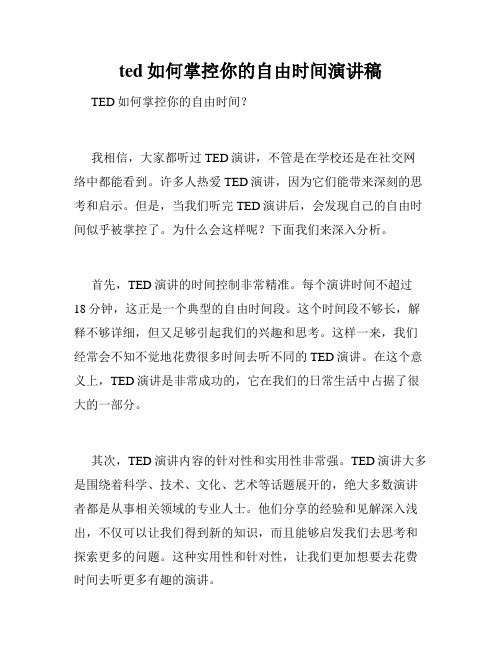
ted如何掌控你的自由时间演讲稿TED如何掌控你的自由时间?我相信,大家都听过TED演讲,不管是在学校还是在社交网络中都能看到。
许多人热爱TED演讲,因为它们能带来深刻的思考和启示。
但是,当我们听完TED演讲后,会发现自己的自由时间似乎被掌控了。
为什么会这样呢?下面我们来深入分析。
首先,TED演讲的时间控制非常精准。
每个演讲时间不超过18分钟,这正是一个典型的自由时间段。
这个时间段不够长,解释不够详细,但又足够引起我们的兴趣和思考。
这样一来,我们经常会不知不觉地花费很多时间去听不同的TED演讲。
在这个意义上,TED演讲是非常成功的,它在我们的日常生活中占据了很大的一部分。
其次,TED演讲内容的针对性和实用性非常强。
TED演讲大多是围绕着科学、技术、文化、艺术等话题展开的,绝大多数演讲者都是从事相关领域的专业人士。
他们分享的经验和见解深入浅出,不仅可以让我们得到新的知识,而且能够启发我们去思考和探索更多的问题。
这种实用性和针对性,让我们更加想要去花费时间去听更多有趣的演讲。
最后,TED演讲打破了时间和地域的限制。
每年TED会议都会邀请来自全球各个领域的人士,来分享自己的故事和见解。
而且TED会议也支持在线观看,这意味着无论你在哪里,只要有网络就能够欣赏到TED演讲的精华。
这种便利性和全球性,使得TED演讲成为了一个真正的文化现象,影响了数百万人的思想和生活方式。
总之,TED演讲的成功不仅在于它具有很高的质量和实用性,而且在于它成为了一个具有强烈影响力的文化现象。
这种现象不仅仅在TED演讲的时间内被体现出来,而且在我们的自由时间中也被深深地占据和影响着。
TED演讲如何掌控我们的自由时间?答案是,它通过时间控制、实用性和全球性成为了一个价值和思想的载体。
而我们,也因为这种价值和思想的影响而愿意将时间奉献给TED演讲。
最后,我想说的是,我们需要好好利用TED演讲,提高我们的自我认知和能力。
但同时,我们也需要好好管理好自己的自由时间,让自己的生活变得更加充实和有意义。
ted如何掌控你的自由时间演讲稿
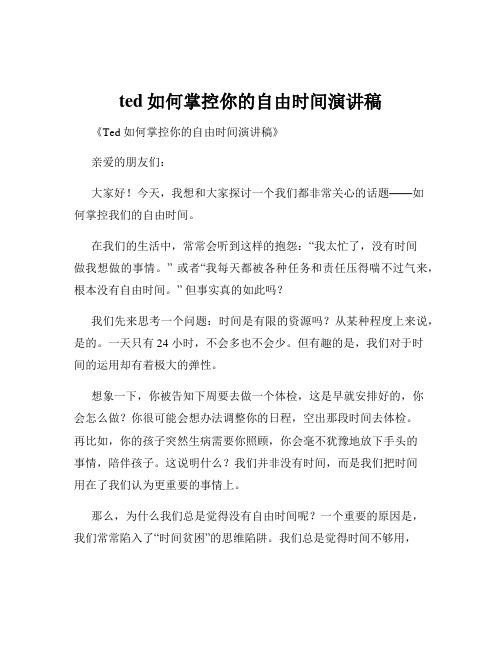
ted如何掌控你的自由时间演讲稿《Ted 如何掌控你的自由时间演讲稿》亲爱的朋友们:大家好!今天,我想和大家探讨一个我们都非常关心的话题——如何掌控我们的自由时间。
在我们的生活中,常常会听到这样的抱怨:“我太忙了,没有时间做我想做的事情。
” 或者“我每天都被各种任务和责任压得喘不过气来,根本没有自由时间。
” 但事实真的如此吗?我们先来思考一个问题:时间是有限的资源吗?从某种程度上来说,是的。
一天只有 24 小时,不会多也不会少。
但有趣的是,我们对于时间的运用却有着极大的弹性。
想象一下,你被告知下周要去做一个体检,这是早就安排好的,你会怎么做?你很可能会想办法调整你的日程,空出那段时间去体检。
再比如,你的孩子突然生病需要你照顾,你会毫不犹豫地放下手头的事情,陪伴孩子。
这说明什么?我们并非没有时间,而是我们把时间用在了我们认为更重要的事情上。
那么,为什么我们总是觉得没有自由时间呢?一个重要的原因是,我们常常陷入了“时间贫困”的思维陷阱。
我们总是觉得时间不够用,于是在忙碌中匆匆度过每一天,却没有停下来思考,我们真正想要的是什么,哪些事情对我们来说是最重要的。
那么,如何打破这种困境,掌控我们的自由时间呢?首先,我们要转变思维方式。
不要再把自己看作是时间的受害者,而是时间的管理者。
我们要认识到,我们总是有时间去做重要的事情,关键在于我们如何选择。
接下来,我们要明确自己的价值观和目标。
问问自己,在生活中,什么是最重要的?是事业的成功?是家庭的幸福?是个人的成长?还是健康和休闲?当我们清楚地知道自己的价值观和目标时,我们就能更容易地判断哪些事情值得我们花费时间,哪些事情可以舍弃。
然后,我们要学会对不重要的事情说“不”。
在生活中,我们常常面临各种各样的请求和诱惑,比如参加一个不太重要的聚会,或者接手一个不属于自己职责范围内的工作。
如果这些事情与我们的价值观和目标不符,我们要有勇气拒绝,这样才能为重要的事情腾出时间。
如何限制游玩时间英语作文
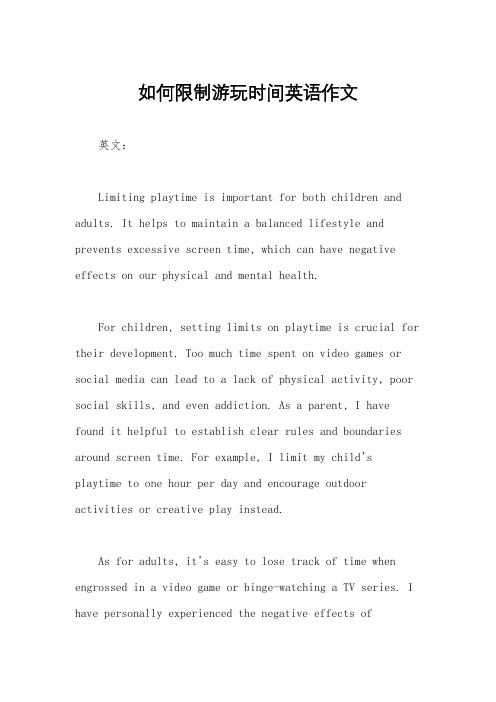
如何限制游玩时间英语作文英文:Limiting playtime is important for both children and adults. It helps to maintain a balanced lifestyle and prevents excessive screen time, which can have negative effects on our physical and mental health.For children, setting limits on playtime is crucial for their development. Too much time spent on video games or social media can lead to a lack of physical activity, poor social skills, and even addiction. As a parent, I have found it helpful to establish clear rules and boundaries around screen time. For example, I limit my child's playtime to one hour per day and encourage outdooractivities or creative play instead.As for adults, it's easy to lose track of time when engrossed in a video game or binge-watching a TV series. I have personally experienced the negative effects ofexcessive screen time, such as eye strain, poor sleep, and decreased productivity. To address this, I have set a timer to remind myself to take regular breaks and engage in other activities. Additionally, I have designated specific times for leisure activities, allowing myself to enjoy themwithout feeling guilty or neglecting other responsibilities.In conclusion, limiting playtime is essential for maintaining a healthy balance in our lives. By settingclear boundaries and finding alternative activities, we can prevent the negative effects of excessive screen time and enjoy a more fulfilling lifestyle.中文:限制游玩时间对于孩子和成人都非常重要。
如何高效管理时间(英文作文)
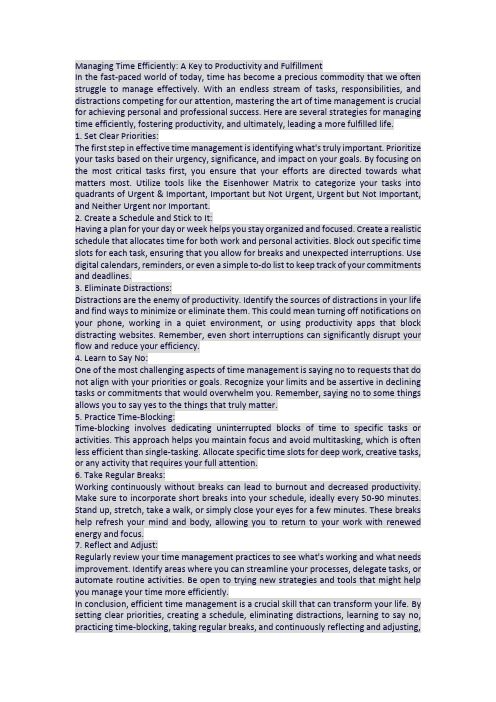
Managing Time Efficiently: A Key to Productivity and FulfillmentIn the fast-paced world of today, time has become a precious commodity that we often struggle to manage effectively. With an endless stream of tasks, responsibilities, and distractions competing for our attention, mastering the art of time management is crucial for achieving personal and professional success. Here are several strategies for managing time efficiently, fostering productivity, and ultimately, leading a more fulfilled life.1. Set Clear Priorities:The first step in effective time management is identifying what's truly important. Prioritize your tasks based on their urgency, significance, and impact on your goals. By focusing on the most critical tasks first, you ensure that your efforts are directed towards what matters most. Utilize tools like the Eisenhower Matrix to categorize your tasks into quadrants of Urgent & Important, Important but Not Urgent, Urgent but Not Important, and Neither Urgent nor Important.2. Create a Schedule and Stick to It:Having a plan for your day or week helps you stay organized and focused. Create a realistic schedule that allocates time for both work and personal activities. Block out specific time slots for each task, ensuring that you allow for breaks and unexpected interruptions. Use digital calendars, reminders, or even a simple to-do list to keep track of your commitments and deadlines.3. Eliminate Distractions:Distractions are the enemy of productivity. Identify the sources of distractions in your life and find ways to minimize or eliminate them. This could mean turning off notifications on your phone, working in a quiet environment, or using productivity apps that block distracting websites. Remember, even short interruptions can significantly disrupt your flow and reduce your efficiency.4. Learn to Say No:One of the most challenging aspects of time management is saying no to requests that do not align with your priorities or goals. Recognize your limits and be assertive in declining tasks or commitments that would overwhelm you. Remember, saying no to some things allows you to say yes to the things that truly matter.5. Practice Time-Blocking:Time-blocking involves dedicating uninterrupted blocks of time to specific tasks or activities. This approach helps you maintain focus and avoid multitasking, which is often less efficient than single-tasking. Allocate specific time slots for deep work, creative tasks, or any activity that requires your full attention.6. Take Regular Breaks:Working continuously without breaks can lead to burnout and decreased productivity. Make sure to incorporate short breaks into your schedule, ideally every 50-90 minutes. Stand up, stretch, take a walk, or simply close your eyes for a few minutes. These breaks help refresh your mind and body, allowing you to return to your work with renewed energy and focus.7. Reflect and Adjust:Regularly review your time management practices to see what's working and what needs improvement. Identify areas where you can streamline your processes, delegate tasks, or automate routine activities. Be open to trying new strategies and tools that might help you manage your time more efficiently.In conclusion, efficient time management is a crucial skill that can transform your life. By setting clear priorities, creating a schedule, eliminating distractions, learning to say no, practicing time-blocking, taking regular breaks, and continuously reflecting and adjusting,you can unlock your full potential and achieve greater productivity and fulfillment. Remember, time is a non-renewable resource; invest it wisely.。
- 1、下载文档前请自行甄别文档内容的完整性,平台不提供额外的编辑、内容补充、找答案等附加服务。
- 2、"仅部分预览"的文档,不可在线预览部分如存在完整性等问题,可反馈申请退款(可完整预览的文档不适用该条件!)。
- 3、如文档侵犯您的权益,请联系客服反馈,我们会尽快为您处理(人工客服工作时间:9:00-18:30)。
Ted演讲标题:如何掌控你的自由时间When people find out I write about time management,They assume two things.One is that I’m always on time,And I’m not.I have four small children,And I would like to blame them for my occasional tardiness,But sometimes it’s just not their fault.I was once late to my own speech on time management.We all had to just take a moment together and savor that irony.The second thing they assume is that I have lots of tips and tricks for saving bits of time here and there.Sometimes I’ll hear from magazines that are doing a story along these lines,generally on how to help their readers find an extra hour in the day.And the idea is that we’ll shave bits of time off everyday activities,add it up,and we’ll have time for the good stuff.And I question the entire premise of this piece,but I’m always interested in hearing what they’ve come up with before they call me.Some of my favorites:doing errands where you only have to make the right-hand turns;Being extremely judicious in microwave usage:it says three to three-and-a-half minutes on the package,we’re totally getting in on the bottom side of that.And my personal favorite,which makes sense on some level,is to DVR your favorite shows so you can fast-forward through the commercials.That way,you save eight minutes every half hour,so in the course of two hours of watching TV,you find32minutes to exercise.which is true.You know another way to find 32minutes to exercise?Don’t watch two hours of TV a day,right?Anyway,the idea is we’ll save bits of time here and there,add it up,we will finally get to everything we want to do.当人们发现我在写关于时间管理的内容时,他们总会假设两件事。
一件事是我总是很守时,但是我不是。
我有四个小孩,我倒是很想把偶尔的迟到怪到他们头上,但是有时候并不是他们的责任。
我有次连自己的时间管理讲座都迟到了。
当时大家只得一起体会了一下其中的讽刺意味。
第二件事就是他们觉得我有很多诀窍来节省各种零散的时间。
有时候我会收到杂志的来信说他们正在根据这样的思路写文章,通常是关于如何帮助读者在一天中抽出一个小时的时间。
这个想法是说我们从日常活动中省出零散的时间,加起来,这样我们就有足够的时间来做有意义的事了。
我对这个概念的整个前提保持怀疑,但我总是很感兴趣他们在给我打电话前想出了什么点子。
有几个是我很喜欢的:出去办事选择一路全是右转弯的地方;极其谨慎地使用微波炉:包装上说叮三到三分半钟,那就绝对只叮三分钟。
我个人最喜欢的,从某种程度来说还算有道理,就是把喜欢的节目录下来这样就能快进广告。
这样,每半小时能节省八分钟,那么在看两个小时电视的过程中,你就有32分钟来锻炼。
这倒是真的。
可你们知道找32分钟锻炼的另一种方法吗?就是一天不要看两小时电视,对吗?总之,这个理论就是我们节省零散的时间,加起来,最终我们就能做到我们想做的所有事情。
assume[əˈsju:m]假定occasional[əˈkeʒənəl]偶尔的tardiness['tɑ:dɪnəs]拖延savor['seɪvə]品尝irony[ˈaɪrəni]讽刺shave[ʃeɪv]刮毛premise['premɪs]前提errands[ˈerənd]差事judicious[dʒuˈdɪʃəs]明智的usage[ˈju:sɪdʒ]用法commercials[kə'mɜ:ʃlz]广告But after studying how successful people spend their time and looking at their schedules hour by hour,I think this idea has it completely backward.We don’t build the lives we want by saving time.We build the lives we want,and time saves itself.Here’s what I mean.I recently did a time diary project,looking at1,001days in the lives of the extremely busy women.They had demanding jobs,sometimes their own business,kids to care for,maybe parents to care for,community commitments....busy,busy people.I had them keep track of their time for a week.So I could add up how much they worked and slept,and I interviewed them about their strategies,for my book.One of the women whose time log I studied,she goes out on a Wednesday night for something.She comes home to find that her water heater has broken,and there is now water all over her basement.If you’ve had anything like this happen to you,you know it is a hugely damaging,frightening,sopping mess.So she’s dealing with the immediate aftermath thatnight,next day she’s got plumbers coming in,day after that,professional cleaning crew dealing with the ruined carpet.All this is being recorded on her time log.Winds up taking seven hours of her week.Seven hours.That’s like finding an extra hour in the day.But I’m sure if you had asked her at the start of the week,”Could you find seven hours to train for a triathlon?””Could you find seven hours to mentor seven worthy people?”I’m sure she would’ve said what most of us would’ve said,which is,”No,can’t you see how busy I am?”但是在研究了成功人士如何使用时间之后并且逐个小时审视了他们的日程表,我认为这个理论已经彻底落后了。
我们并不是通过节省时间创造想要的生活。
而是先创造想要的生活,然后时间就自动省下来了。
接下来我会进行说明。
我最近在做一个时间日记项目,观察那些非常繁忙的女性一千零一天的生活。
她们都有繁忙的工作,有些是自己创业,要照顾孩子,还要照顾老人,要做社区服务.....非常,非常忙。
我让她们每周做时间记录。
这样我就能计算她们工作和睡觉的时间总和,为了收集资料,我还询问她们的安排策略。
我研究了其中一位女士的时间日志,有个星期三晚上,她出门办了点儿事。
回家时发现家里的热水器坏了,地下室已经被水淹了。
如果你曾经历类似的事,就知道,这是一场巨大的破坏,淹得一塌糊涂。
那天晚上她就面临了这场突发灾难,第二天她找来了水管工,又隔一天,她找来专业的清理团队处理损毁的地毯。
这些都记录在她的时间日志上。
占用了她一周七个小时的时间。
七个小时,那就是每天多出一个小时。
但我相信如果那一周开始的时候我问她,“你能挤出七小时进行铁人三项运动吗?”“你能挤出七小时辅导七个值得辅导的人吗?”我相信她会和我们大多数人一样,说,“不能,你看不出我有多忙吗?”demanding[dɪˈmændɪŋ]要求高的community[kəˈmjunɪti]社区commitments[kə'mɪtmənts]承担的义务heater[ˈhitɚ]加热器frightening[ˈfraɪtnɪŋ]令人恐惧的sopping[ˈsɑ:pɪŋ]湿透的plumber[ˈplʌmɚ]水管工crew[kru]全体船员carpet[ˈkɑ:rpɪt]地毯wind up[wɪndʌp]结束triathlon[traɪ'æθlən]三项全能运动Mentor['mentɔ:r]指导Yet when she had to find seven hours because there is water all over her basement,she found seven hours.And what this shows us is that time is highly elastic.We cannot make more time,but time will stretch to accommodate what we choose put into it.And so the key to time management is treating our priorities as the equivalent of that broken water heater.To get at this,I like to use language from one of the busiest people I ever interviewed.By busy,I mean she was running a small business with12people on the payroll,she had six children in her spare time.I was getting in touch with her to set up an interview on how she“had it all”....that phrase.I remember it was a Thursday morning,and she was not available to speak with me.Ofcourse,right?But the reason she was unavailable to speak with me is that she was out for a hike,because it was a beautiful spring morning,and she wanted to go for a hike.So of course this makes me even more intrigued,and when I finally do catch up with her,she explains it like this.She says,”Listen,Laura,everything I do,every minute I spend,is my choice.”And rather than say,”I don’t have time to do x,y or z,”she’d say,”I don’t do x,y or z because it’s not a priority.””I don’t have time,”often means”It’s not a priority.”If you think about it,that’s really more accurate language.I mean I could tell you I don’t have time to dust my blinds,but that’s not true.If you offered to pay me$100,000to dust my blinds,I would get to it pretty quickly.Since that is not going to happen,I can acknowledge this is not a matter of lacking time,it’s that I don’t want to do ing this language reminds us that time is a choice.And granted,there may be horrible consequences for making different choices,I will give you that.But we are smart people,and certainly over the long run we have the power to fill our lives with the things that deserve to be there.可是当家里的地下室淹着水,她不得不因此挤出七小时,她挤出了七个小时。
